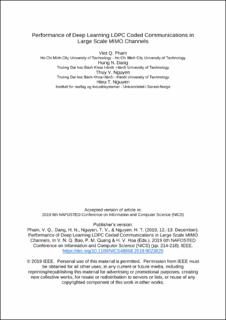| dc.contributor.author | Pham, Viet Q. | |
| dc.contributor.author | Dang, Hung N. | |
| dc.contributor.author | Nguyen, Thuy V. | |
| dc.contributor.author | Nguyen, Hieu | |
| dc.date.accessioned | 2020-11-09T14:16:16Z | |
| dc.date.available | 2020-11-09T14:16:16Z | |
| dc.date.created | 2020-03-24T14:33:04Z | |
| dc.date.issued | 2019 | |
| dc.identifier.citation | Pham, V. Q., Dang, H. N., Nguyen, T. V., & Nguyen, H. T. (2019, 12.-13. desember). Performance of Deep Learning LDPC Coded Communications in Large Scale MIMO Channels. I V. N. Q. Bao, P. M. Quang & H. V. Hoa (Red.), 2019 6th NAFOSTED Conference on Information and Computer Science (NICS) (s. 214-218). IEEE. | en_US |
| dc.identifier.isbn | 978-1-7281-5163-2 | |
| dc.identifier.uri | https://hdl.handle.net/11250/2686967 | |
| dc.description.abstract | In this paper, we investigate the performance of a large-scale multiple-input multiple-output (LS-MIMO) receiver, which deploys a deep neural network and a low-density paritycheck (LDPC) code for detecting and decoding disturbed signals. The structure of the low-complexity receiver is also proposed. The proposed receiver was tested with different LS-MIMO configurations to reveal the performance and complexity tradeoff. Besides, our investigation shows that the performance gap of the proposed receiver and the conventional one decreases as the number of transmitting and receive antennas increase. In particular, our experiment results show that the proposed low-complexity receiver has performance loss of about 1:8 dB and 1:5 dB in 10 x 10 and 32 x 32 LS-MIMO configurations, respectively. | en_US |
| dc.language.iso | eng | en_US |
| dc.publisher | IEEE | en_US |
| dc.title | Performance of Deep Learning LDPC Coded Communications in Large Scale MIMO Channels | en_US |
| dc.type | Chapter | en_US |
| dc.description.version | acceptedVersion | en_US |
| dc.rights.holder | © 2019 IEEE. | en_US |
| dc.source.pagenumber | 5 | en_US |
| dc.identifier.doi | https://doi.org/10.1109/NICS48868.2019.9023820 | |
| dc.identifier.cristin | 1804467 | |
| cristin.ispublished | true | |
| cristin.fulltext | original | |
| cristin.qualitycode | 1 | |
